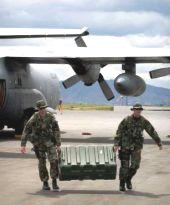Sudan refuses entry to AU soldiers on US planes for Darfur mission
KHARTOUM, Oct 25 (AFP) — Khartoum on Monday refused to allow African Union (AU) soldiers, due to monitor a ceasefire between government troops and rebel forces in the western region of Darfur, to fly in to Sudan on US planes.

|
|
Troops from the U.S. Air Force’s 86th Airlift Wing unload boxes of weapons upon arrival in the Rwandan capital Kigali October 23, 2004, aboard three U.S. Air Force C-130 cargo planes. The planes will transport Rwandan forces and equipment to Darfur over the next two weeks to assist an African Union peacekeeping effort in the violent region of western Sudan. It is the first U.S. military deployment in the Darfur conflict. |
“This is not a bilateral issue and the matter should be handled by the African Union in accordance with clear-cut guarantees and a certain time period,” Foreign Minister Mustafa Osman Ismail told reporters.
He said the Sudanese government had informed the AU of its position but had “not yet had any response”.
“We will never accept any US planes on Sudanese territory other than under an AU agreement that does not violate Sudanese national security … and as long as the (planes) leave immediately after their mission” said Ismail.
He accused the US administration of waging a “campaign of misinformation” on the humanitarian crisis in Darfur “to distract international attention away from events in Iraq and Palestine”.
Khartoum, however, would “cooperate closely with the African Union” so the organisation could transport its troops for of their mission in Darfur, Ismail added.
The more than 3,000-strong AU force is to be made up of troops from the Gambia, Rwanda, Nigeria, South Africa, Egypt, Algeria and Tanzania, the foreign minister said. The first contingent had been expected to arrive Monday.
Ismail said he would brief the Sudanese parliament on Tuesday on the expansion of the mandate and the length of the AU mission in western Sudan.
